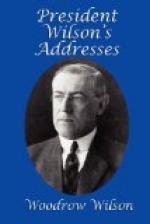We have already been provident in this great matter and supplied ourselves with the instrumentalities of prompt adjustment. We have created, in the Federal Trade Commission, a means of inquiry and of accommodation in the field of commerce which ought both to cooerdinate the enterprises of our traders and manufacturers and to remove the barriers of misunderstanding and of a too technical interpretation of the law. In the new Tariff Commission we have added another instrumentality of observation and adjustment which promises to be immediately serviceable. The Trade Commission substitutes counsel and accommodation for the harsher processes of legal restraint, and the Tariff Commission ought to substitute facts for prejudices and theories. Our exporters have for some time had the advantage of working in the new light thrown upon foreign markets and opportunities of trade by the intelligent inquiries and activities of the Bureau of Foreign and Domestic Commerce which the Democratic Congress so wisely created in 1912. The Tariff Commission completes the machinery by which we shall be enabled to open up our legislative policy to the facts as they develop.
We can no longer indulge our traditional provincialism. We are to play a leading part in the world drama whether we wish it or not. We shall lend, not borrow; act for ourselves, not imitate or follow; organize and initiate, not peep about merely to see where we may get in.
We have already formulated and agreed upon a policy of law which will explicitly remove the ban now supposed to rest upon cooeperation amongst our exporters in seeking and securing their proper place in the markets of the world. The field will be free, the instrumentalities at hand. It will only remain for the masters of enterprise amongst us to act in energetic concert, and for the Government of the United States to insist upon the maintenance throughout the world of those conditions of fairness and of even-handed justice in the commercial dealings of the nations with one another upon which, after all, in the last analysis, the peace and ordered life of the world must ultimately depend.
At home also we must see to it that the men who plan and develop and direct our business enterprises shall enjoy definite and settled conditions of law, a policy accommodated to the freest progress. We have set the just and necessary limits. We have put all kinds of unfair competition under the ban and penalty of the law. We have barred monopoly. These fatal and ugly things being excluded, we must now quicken action and facilitate enterprise by every just means within our choice. There will be peace in the business world, and, with peace, revived confidence and life.
We ought both to husband and to develop our natural resources, our mines, our forests, our water power. I wish we could have made more progress than we have made in this vital matter; and I call once more, with the deepest earnestness and solicitude, upon the advocates of a careful and provident conservation, on the one hand, and the advocates of a free and inviting field for private capital, on the other, to get together in a spirit of genuine accommodation and agreement and set this great policy forward at once.




